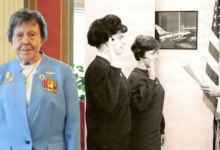Hospitals need more learning disability nurses – report

Hospital patients with learning disabilities are being let down by a lack of specialist nurses and other staff with skills in meeting their needs, a new report suggests.
The Health Services Safety Investigation Branch (HSSIB) this week published an independent report into the care of adults with learning disabilities in acute hospital settings.
“The government must invest in the nursing workforce to address the decline in learning disability nurses and widespread inconsistency in care”
Jonathan Beebee
The report found “persistent and widespread” safety risks for patients with learning disabilities when they are admitted to hospital, despite a “strong commitment” across the NHS to address this.
It used evidence from more than 20 patients with learning disabilities and detailed one case study in particular of a 79-year-old man whose individual needs were found to have been missed in the run-up to his death.
This man was admitted to hospital, after being referred to his GP due to a deterioration in health. After 14 days in hospital, he died following a cardiac arrest.
HSSIB outlined all the reasonable adjustments which should have been made to accommodate the man’s learning disability.
These included extra effort being made to understand him due to a speech impediment, accommodation for his inability to read or write, the need to “get to know” him rather than take his initial responses at face value, and others.
The investigation branch said these needs were not consistently identified, documented or met.
It found that there was only one learning disability nurse at the trust and there was “no back up” when they were not working, which was the case for the first five days of the patient’s admission.
The other staff on the ward had “limited information about his needs and reasonable adjustments” due to issues around documentation storage and sharing.
One major issue in the patient’s care identified by HSSIB was that he needed new hearing aids but did not receive them, creating a further communication barrier that impacted care decisions.
HSSIB’s report went on to detail conversations with other patients and their families, and how they said that being able to communicate, have a routine and form a long-term relationship with clinicians was important to them.
However, it said the health and social care system was “not always designed to effectively care for people with a learning disability”.
Lack of specialists like learning disability nurses meant hospital patients were often cared for by staff without training, skills and experience in working with people with a learning disability.
“These staff often have limited support and are unable to take the time they would like to meet the person’s needs,” it warned.
Among the key recommendations in the report was one aimed at improving access to learning disability nurses in hospitals.
It told NHS England to develop and issue “learning disability liaison nursing service best practice and workforce guidance to all acute hospitals”.
“This report bolsters longstanding concerns over the gaps in care provided to patients with learning disabilities”
Saffron Cordery
Clare Crowley, HSSIB senior safety investigator, said the report’s recommendations were aimed at “reducing the safety risks, tackling inequity in care, and supporting the delivery of safe care to people who may be at their most vulnerable”.
Responding to the report, Jonathan Beebee, professional lead for learning disability nursing at the Royal College of Nursing, highlighted that, since 2009, the number of learning disability nurses had fallen by nearly half. There are now fewer than 3,000 of these nurses working in England’s NHS.
“Coupled with the absence of standard models for learning disability care, the result is a postcode lottery of care,” Mr Beebee added.
“Everyone should expect the same high-quality services wherever they live.
“The government must act now on these report findings. It must invest in the nursing workforce to address the decline in learning disability nurses and widespread inconsistency in care.”
Saffron Cordery, deputy chief executive of NHS Providers, added in response to the report: “This report bolsters longstanding concerns over the gaps in care provided to patients with learning disabilities.
“Trust leaders are committed to stamping out health inequalities and improving quality of care for all, but operational pressures and the lack of available data on health inequalities within the NHS have slowed progress significantly.
“Investing in training programmes would help equip hospital staff with the skills, knowledge and confidence needed to provide effective care to patients with learning disabilities.”
Ms Cordery echoed the HSSIB’s call for nationally standardised guidance for acute learning disability liaison services.







